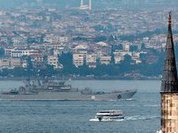Bacteria Mutate Developing Resistance to All Antibiotics
A dangerous new mutation that makes some bacteria resistant to almost all antibiotics has become increasingly common in India and Pakistan and is being found in patients in Britain and the United States who got medical care in those countries, according to new studies.

Experts in antibiotic resistance called the gene mutation, named NDM-1, "worrying" and "ominous," and they said they feared it would spread globally, New York Times reports.
The researchers, led by Timothy Walsh of Cardiff University in the United Kingdom, first discovered the gene in 2009 in samples of pneumonia and E. coli bacteria taken from a Swedish patient in India. The bacteria with the gene resist various types of antibiotics, including those specifically designed to treat infections caused by drug-resistant germs.
The researchers found signs of the bacteria in Bangladesh, India, Pakistan and the United Kingdom. It was most commonly found in a pneumonia strain and an E. coli strain that commonly causes urinary tract infections.
In some cases, the germs resisted all antibiotics, according to the report released online Aug. 11 in advance of publication in the September print edition of The Lancet Infectious Diseases.
The study authors noted that the U.K. patients with NDM-1-producing antibiotic-resistant bacteria had traveled to India or Pakistan for surgery, including cosmetic surgery. Because it is common for people from Europe and the United States to travel internationally for such surgeries, NDM-1 "will likely spread worldwide," Walsh and colleagues concluded, according BusinessWeek.
Subscribe to Pravda.Ru Telegram channel, Facebook, RSS!





